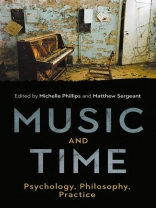How does music manifest through time and, simultaneously, how does time manifest through music?
For the experimental psychologist, the experience of time during music listening or performance is something that may be studied empirically. For philosophers, fundamental questions of time continue to be the subject of ongoing debate in philosophy: is time linear? What are past, present and future? What is duration and what makes a perceptual present, or moment? For the performer, musical time can exist as a subjective vehicle of expression. Although any of the three could be chosen as a starting point, the order presented in the text’s structure offers a journey from empiricism to application, via contemplation.
This volume deals with the complex relationship between music and time. It presents a staunchly interdisciplinary perspective defined by the terms Psychology, Philosophy and Practice. The text is divided into sections concerning ‘experience’, ‘enactment’ and ‘meaning’, as points of intersection between the three primary methodologies of the title. As such, this is a book for the scholar, the student of music, and the interested reader. For the scholar, it offers new interconnections and comparisons. For the student, its pluralistic approach presents the most comprehensive overview available to date regarding the topic. For the interested reader, the volume offers answers to questions which concern us as listeners and audiences at concerts, gigs, and festivals.
Tabla de materias
Introduction
Matthew Sergeant and Michelle Phillips
Part I. Experiences
1. Music Listening and the Perception of Time: The LEMI Model
Michelle Phillips
2. The Remembrance of Things to Be: An Approach to Memory, Repetition, and Cyclical Structures
Bryn Harrison
3. An Overview of the Psychology of Time Perception
Luke A. Jones
4. The Perceptual Present and the Philosophical Puzzle of Musical Experience
Abigail Connor and Joel Smith
Part II. Enactments
5. Ensemble Timing in String Quartets
Alan Wing, Maria Witek, Ryan Stables, and Adrian Bradbury
6. Midway Ambiguities: Disorientation and Interpretation in Long-Duration Music
Philip Thomas
7. Live Coding as a Theatre of Agency and a Factory of Time
Alejandro Franco Briones
Part III. Meanings
8. Comparing Temporal Fictions in Tonality and Triadic Post-Tonality: Chopin’s Fourth Ballade as a Link Between the Ages
Jason Noble
9. Nothing Really Changes’: Material Processes in and as Timein
hearmleoþ-gieddunga
Lauren Redhead
10. Music, Time, and Society
Matthew Sergeant
Conclusion: Multiplicity, Fluidity, Fragility
Michelle Phillips and Matthew Sergeant
Bibliography
Index
Sobre el autor
MATTHEW SERGEANT is a composer and researcher and Reader in Music at Bath Spa University.












